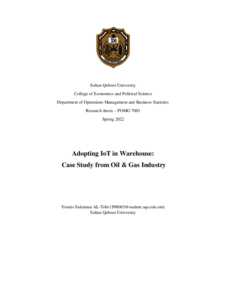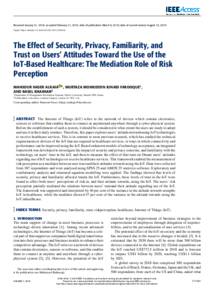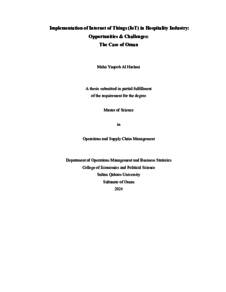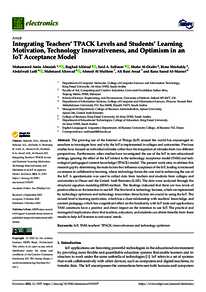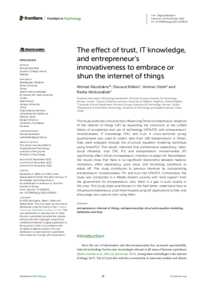Document
Adopting IoT in warehouse : case study from oil & gas industry.
Source
Master's thesis
Country
Oman
City
Muscat
Publisher
Sultan Qaboos University
Gregorian
2022
Language
English
Thesis Type
Master's thesis
English abstract
In recent years, there has been a lot of interest in the application of Internet of Things (IoT)
technologies in warehouse environments. The oil and gas industry's embrace of the Internet of
Things (IoT) has completely changed several aspects of warehouse management. Oil and gas
industry warehouses may increase operational effectiveness, improve safety protocols, and save
money by utilizing IoT technology. Implementing IoT in warehouses allows for real-time
inventory management and monitoring, reducing stockouts, and streamlining the procurement
process. IoT-based asset tracking solutions reduce downtime and enable preventive maintenance
by providing real-time visibility into the movement and location of machinery, tools, and vehicles.
Continuous monitoring of vital equipment is made possible by IoT sensors, allowing for the early
identification of potential problems and the avoidance of expensive failures. In the oil and gas
sector, security and safety are top priorities, and IoT is essential for boosting warehouse safety
measures. Access control systems guarantee that only authorized workers have access to restricted
areas, while connected cameras and environmental sensors can identify threats. Additionally, IoT
technology helps optimize energy use in warehouses, supporting environmental initiatives and
lowering costs. IoT use in oil and gas sector warehouses has several advantages, including
enhanced safety, cost savings, and simpler processes. IoT will be crucial in streamlining warehouse
management and supply chain procedures as the industry continues to embrace digital
transformation, eventually boosting efficiency and productivity in this dynamic industry.
This thesis examines the primary factors influencing the adoption of IoT in warehouses by a
thorough investigation of the body of current literature, case studies, and expert's opinion through
surveys. The need to increase operational effectiveness, boost inventory management, optimize
logistical procedures, and enable real-time data-driven decision-making are among the reasons
cited. The study also examines difficulties encountered in the adoption process, such as
infrastructure needs, data security issues, system integration, and the need for skilled workers.
This study adds to the body of knowledge by providing an in-depth study of IoT adoption in
the oil and gas industry's warehouse operations. Warehouse experts, IT specialists, and industry
decision-makers can use the knowledge gained from this study to help them make well-informed
decisions about implementing IoT, giving them the ability to optimize warehouse processes,
improve operational efficiency, and create competitive advantages in the fast-moving oil and gas
sector.
Arabic abstract
في بيئات المستودعات. إن احتضان (IoT (في السنوات الاخيرة، كان هناك الكثير من الاهتمام بتطبيق تقنيات إنترنت الاشياء قد غير تما ًما العديد من جوانب إدارة المستودعات. قد تزيد مستودعات صناعة (IoT (صناعة النفط والغاز إلنترنت الاشياء النفط والغاز من الفعالية التشغيلية، وتحسن بروتوكوالت السالمة، وتوفر المال باستخدام تقنية إنترنت الاشياء. يسمح تطبيق إنترنت الاشياء في المستودعات بإدارة المخزون في الوقت الفعلي ومراقبته، وتقليل المخزون، وتبسيط عملية الشراء. تعمل حلول تتبع الاصول المستندة إلى إنترنت الاشياء على تقليل وقت التوقف عن العمل وتمكين الصيانة الوقائية من خلال توفير رؤية في الوقت الفعلي لحركة، وموقع الاالت، والادوات، والمركبات. أصبح الرصد المستمر للمعدات الحيوية ممكنًا بواسطة مستشعرات إنترنت الاشياء، مما يسمح بالتعرف المبكر على المشكالت المحتملة وتجنب الفشل الباهظ الثمن. في قطاع النفط والغاز، يعد الامن والسالمة من الاولويات القصوى، كما أن إنترنت الاشياء ضروري لتعزيز تدابير سالمة المستودعات. تضمن أنظمة التحكم في الوصول أن العمال المصرح لهم فقط يمكنهم الوصول إلى المناطق المحظورة، في حين أن الكاميرات المتصلة وأجهزة الاستشعار البيئية يمكنها تحديد التهديدات. بالاضافة إلى ذلك، تساعد تقنية إنترنت الاشياء على تحسين استخدام الطاقة في المستودعات، ودعم المبادرات البيئية وخفض التكاليف. يتمتع استخدام إنترنت الاشياء في مستودعات قطاع النفط والغاز بالعديد من المزايا، بما في ذلك تعزيز السالمة وتوفير التكاليف والعمليات الابسط. ستكون إنترنت الاشياء حاسمة في تبسيط إجراءات إدارة المستودعات وسلسلة التوريد حيث تستمر الصناعة في تبني التحول الرقمي، مما يعزز في النهاية الكفاءة والانتاجية في هذه الصناعة الديناميكية. تبحث هذه الورقة العوامل الاساسية التي تؤثر على اعتماد إنترنت الاشياء في المستودعات من خلال تحقيق شامل في مجموعة الادبيات الحالية ودراسات الحالة ورأي الخبير من خلال المسوحات. من بين الاسباب المذكورة الحاجة إلى زيادة الفعالية التشغيلية، وتعزيز إدارة المخزون، وتحسين الاجراءات اللوجستية، وتمكين اتخاذ القرار القائم على البيانات في الوقت الحقيقي. تدرس الدراسة أي ًضا الصعوبات التي تمت مواجهتها في عملية التبني، مثل احتياجات البنية التحتية، وقضايا أمن البيانات، وتكامل النظام، والحاجة إلى العمال المهرة. تضيف هذه الدراسة إلى مجموعة المعرفة من خلال تقديم دراسة متعمقة العتماد إنترنت الاشياء في عمليات المستودعات في صناعة النفط والغاز. يمكن لخبراء المستودعات والمتخصصين في تكنولوجيا المعلومات وصناع القرار في الصناعة استخدام المعرفة المكتسبة من هذه الدراسة لمساعدتهم على اتخاذ قرارات مستنيرة بشأن تنفيذ إنترنت الاشياء، منحهم القدرة على تحسين عمليات المستودعات، وتحسين الكفاءة التشغيلية، وخلق مزايا تنافسية في قطاع النفط والغاز سريع الحركة.
Category
Theses and Dissertations

